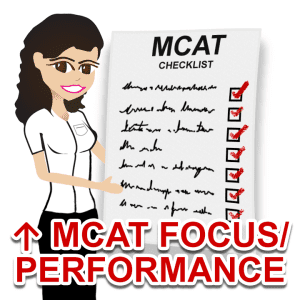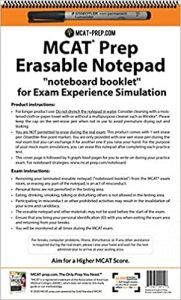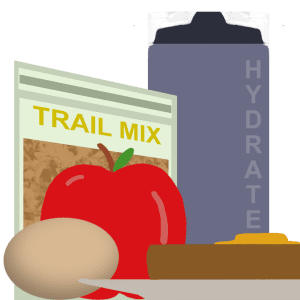 You’ve put in the work.
You’ve put in the work.
Hundreds of hours poring over MCAT sciences, practice passages, full lengths and more.
All leading up to one big event – your MCAT Test Day.
Can you afford to…
– fade halfway through the Bio/Biochem section?
– deal with stomach issues during CARS?
– miss a few questions because you’re desperate to be done partway through Psych/Soc?
Picture two pre-med students with very similar academic backgrounds, coming into test day with similar full length scores.
One succumbs to any of the above, while the other powers through and finishes strong.
Is it too far-fetched to assume that student #2 scores a few points higher?
I don’t think so.
After sacrificing so much and putting all this time and effort into your MCAT prep, I’d hate to see you lose points due to external factors on test day.
How do you gain that edge and maximize those ‘confidence’ points?
Other than MCAT academics (content, practice, strategy), any of the following can help make or break your MCAT testing day experience:
- Easily finding the testing center
- Familiarity with the process- from registration to scoring
- Scratch pad + pen issues
- Temperature control (clothing)
- Level of stress
- Fatigue
- Food and drink
- Bathroom plan
- Caffeine schedule and utilization
- Exam endurance
- Mental preparation for ‘worst case scenario’ issues
Finding the Testing Center
This sounds really simple.
You know exactly where you’re testing. You have the address, so just show up on you MCAT test date.
Not quite!
You never know what could pop up, so let’s prepare for this. If your testing center is reasonably close (i.e. you're not flying to another location to test), consider a dry run once or twice.

Say your testing center is 30 minutes away and you’re testing on a Friday.
Can you drive there on 2 random Fridays, ideally at the same time that you’d be driving for your actual test?
See how long the drive takes. What’s the traffic like?
Scope out the testing center.
Is there parking out front? If not, where do you park?
See if they’ll let you in. Can you poke around the building? What does the testing room look like? How are the seats arranged?
If they won’t let you in, arrive early on test day and IMMEDIATELY locate the bathrooms so that you’re not left wandering during your precious test breaks.
If taking public transportation, do you know which bus or train to take?
Do they run on time? Do you need a transfer or two?
How far is the walk from home to transport and transport to the testing center?
Is it easy enough to locate?
All good questions to have an answer to!
Familiarity With The Testing Process
If you’re following my 3-phase approach, then this should be second nature.
But don’t take it for granted.
Make sure you know exactly what to expect on the MCAT.
What happens before your exam?
What are YOU going to do during the short tutorial and Examinee Agreement?
Many students use these few minutes to relax, breath, meditate and mentally prepare.
Others (I don’t advise this) use this time to brain-dump equations onto their scrap paper.
Are you comfortable with the exam format itself?
How many questions and passages are there per section?
What is the duration of each section and the breaks in between?
All of this is explained here in The New MCAT Demystified.
Scratch Pad + Pen Issues
Perhaps you’re used to practicing with endless clean scrap paper, perhaps even a flawless pen or pencil and eraser. Are you TOO comfortable?
If yes, let’s change it up.
The MCAT will provide you with an 8-page notepad and wet erase marker.
This acts as non-erasable ink!
Be prepared for this.

Sure, you can ask for a second notepad AFTER filling up your first, but you’re better off learning to limit your notes to maintain test flow.
Consider using dull marker, or even a crayon, for your next practice full length.
Make yourself uncomfortable, so that you’re even more ready on test day.
You can even practice with a replica of the official scratch paper booklet, which you can find on Amazon here: MCAT Prep Erasable Notepad (noteboard booklet) with Staedtler Marker
Many students complain that the marker has a dull tip or didn’t write well.
Ask to try your marker first, or even ask for a spare, BEFORE sitting down to your exam.
Personal Temperature Control – Clothing
Ever notice that, when it’s cold outside, indoor spaces are steaming hot?
But then, when it’s hot out, you might need a winter jacket inside some businesses?
Don’t risk being uncomfortable on test day.
Dress for comfort, dress for the weather, dress for crazy temperature fluctuations, and dress for security searches.
First, dress for comfort.
No one cares what you look like on test day.
Don’t bother with fancy clothes, uncomfortable shoes or makeup.
Wear your most comfortable clothes. Wear your pajamas for all they care.
Practice these conditions during your full length practice tests.
Try to avoid pockets because you’ll have to turn out EACH ONE every time you re-enter the testing room.
No matter how hot or cold out, be prepared for the opposite.
The best thing to do is wear comfortable layers so that you can go with minimal clothing or be bundled up, depending on the conditions, and still feel comfortable.
Think pocketless comfy shorts (ex yoga shorts) with jeans or sweats on top.
If it’s cold, you’re not uncomfortable despite the inner shorts.
If it’s hot, ditch the pants.
For uppers, consider a thin tank top, covered with a short-sleeve t-shirt, covered with a loose sweatshirt (I wear these near daily) and then a bulkier layer if (like me) you’re the type of person who’s always REALLY cold. If the bulky layer is a jacket, you may be forced to leave that outside. Instead, think of a regular hoodie and a bigger hoodie over that.
With this setup, if it’s really hot, you’re in shorts and a tank top.
If it’s really cold, you’re in pants + t-shirt + hoodie + bulkier layer.
If you cannot dress down for religious reasons,
consider a thin outer layer, such as a loose long-sleeve shirt, and a few warm layers beneath. If too hot, ditch the inner layers without sacrificing your dress code.
Consider removable leggings under your skirt.
Consider thin breathable head coverings.
(Only for religious reasons, i.e. kippa or hijab. Otherwise, you will not be allowed to wear a hat or cap. See #3 on the AAMC Candidate Rules Agreement.)

Masks During The Pandemic
With the pandemic slowly (hopefully) winding down, testing centers allow but do not require students to test with a mask. But this could change, so check well in advance. The last thing you want on test day is someone distracting you from a passage by telling you to fix your mask.
Practice taking your full lengths while (properly) wearing the mask you intend to use on test day.
Level of Stress
Let me start this section by reminding you that there is nothing wrong with you if you suffer from stress or testing anxiety. If you think this is a big issue, please speak with your doctor and see what can be done.
My advice below refers to ‘regular’ testing anxiety that is not managed by medication.
First, recognize that, no matter how prepared you are, you’ll likely still stress on your MCAT test day.
This test is a big deal with a lot riding on it. Stressing just makes you human.
The key is to reduce the stress enough so that it doesn’t impact your test day performance.
I’ve found 2 things to really help with this:
- Actively reduce your stress prior to the exam.
- Learn how to calm yourself down during and between test sections.
Reducing Stress Prior
I see stress as a strong negative energy. As such, I’ve personally found that intentionally expending energy helps release stress and puts you in a calmer state to deal with additional stress.
If you don’t already have a good workout routine, consider starting one now.
Nothing too crazy, just something to forcibly expel extra energy.
Say you’re a week out from test day. Consider implementing 1-3 daily walks of 20 minutes each. It’s not a lot, and trust me, it really helps.
This also works ON test day. Try a 15 minute aerobic or cardio YouTube video, a short 10-15 minute run, bike ride or similar, or a 20-30 minute walk.
Come home, shower, eat. Then, head out to your exam.
Many students also benefit from doing a 20-30 minute yoga session. Search YouTube for different options.
I prefer the exertion (run) and THEN the relaxation (yoga) so that I’m not too stressed to relax.
Relaxing DURING the Exam
What can you do DURING the exam to help you relax?
Back when I took the old MCAT (I was banned from the new one), I did jumping jacks in the bathroom during every break. First, the other students looked at me like I was nuts. Then, they joined me.
Not up for jumping jacks? What about squats or push-ups? Or simple deep breathing where you bring your hands over your head with every inhale? Anything to get the blood flowing.
You can also try mantras, deep breathing/breath-holds, or 2-minute yoga before the start of every section.
I also recommend a quick 5-10 second deep breath between passages to clear your mind so that you can start fresh on the next one.
Fatigue
This is a big deal for many students. Do you remember the last time you had something exciting in the morning and planned to be well rested? You went to bed early and really really tried to fall asleep.
But then you spent most of the night tossing and turning, too nervous for the next day. This was me the night before my ultrasound that FINALLY showed us a heartbeat (My son came after a 4.5 year infertility journey)
This is typical for most students before test day.
I’d hate for you to have put in so much work before test day, only to find yourself unable to concentrate because you’re yawning throughout the entire exam, trying so hard not to pass out.
Have you also noticed that sometimes you can pull an all-nighter after a week of restful sleep, and somehow not feel too crappy the next day?
Assuming you won’t be able to sleep too well the night before your actual test day, use the weeks prior to build up your sleep reserves.
Attempt to get onto a test day schedule in the weeks (or days) leading up to it.
2-3 days prior is the minimum. A week before is good. A month is ideal.
I explain this strategy in detail here: Wake Up To A Better MCAT Score
Nutrition and Hydration
How well can you really concentrate on the MCAT if your stomach is growling in hunger, if you’re aching from food that didn’t quite sit well with you, or if you’re experiencing a postprandial crash?
Sounds silly, right?
Alas, I can share too many horror stories of students who took test day nutrition for granted and ultimately paid the price.
You’re not looking to feast on test day. Many students are so nervous they can’t even eat. Others grab something quick without putting thought into it, only to realize later that it was a mistake.
Test day nutrition begins the night before, so let’s carefully plan what you eat for dinner, breakfast, and then during the exam itself.
Do test this out in the weeks leading up to your MCAT so you know for sure what you can/cannot handle
Dinner
Dinner before your MCAT should be a decent filling meal, ideally on the more bland side. You want something that will fill you up, provide decent nutrition, and NOT upset your stomach the next day.
Aim for clean/simple nutrients, ideally higher in protein and fat and lower in carbs. Especially avoid refined carbohydrates that will send you on an insulin roller coaster.
DO NOT carb-load. You’re not looking to stock up your glycogen stores like a marathon runner.
Breakfast
The same holds true for breakfast before your exam. Ditch the bagel, oatmeal, and pastries. We want your glucose and insulin levels to remain stable and constant throughout the day.
Think high protein and healthy fat to keep you on an even keel. No spike and crash.
Plan a meal that has enough calories if you’re hungry, but is simple enough to force down (a bit) if you’re too nervous.
For example, I’ve seen great success with meat/cheese sandwiches, or eggs and toast. Or a legume or quinoa with avocado wrap for vegans.

Snacks during MCAT breaks
The MCAT includes two 10-minute breaks and one 30-minute break.
No matter how nervous you feel during your exam, I strongly urge you to force some (non-sugary) calories into your system during every single break.
Prepare for 2 scenarios:
1- Too nervous to eat. What can I force in?
2- Able to eat. What will properly hold me?
Forced Snacks
Force-in snacks are key because, unless you’re conditioned to intermittent fasting, you’ll crash due to lack of nutrition.
My students have found success with the following ‘force-in’ snacks:
- Trail mix that includes both nuts (fat/protein) and some fruit/candy (carb)
- Apple with (sugar-free) nut butter
- Protein bars or energy bars that are NOT too high in sugar (I love Kind bars.)
- Sliced hard boiled egg and cheese
- Jerky, sugar-free variety. (I love Epic beef and venison.)
- Avocado (Add lemon so it doesn’t brown.)
- Legumes: chickpeas or peas (I love eating these raw.)
If you’re too nervous to eat and all you consume is a quarter of an egg, a small piece of cheese, or 5 pieces of trail mix, it’s still better than nothing. AND it won’t give you a quick sugar spike and crash (compared to eating just candy).
Proper Snacks / Lunch
If you’re NOT too nervous to eat (I’m an emotional eater and so I can ALWAYS eat), consider the above as backup snacks for the shorter breaks, but you’ll also want a proper MINI meal for your lunch break. Again, let’s avoid an intense postprandial crash.
My students have found success with the following packed lunches:
- Protein-focused wrap: filled with meat and/or cheese, egg salad… but easy on the fibrous veggies.
- Sandwich (careful with the carb balance here): filled with proteins/fats like meat, cheese, eggs, avocado, peanut butter (opt for sugar-free).
- ‘Bowl’ meals: skip the greens, aim for grains, top with nutrient-dense veggies and protein.
- Vegan option: quinoa bowl with avocado, chickpeas/beans, cucumber, tomato, nuts/seeds… (or wrap with similar ingredients).
DO NOT WAIT until right before test day to plan your meals.
Consider the above suggestions and test them out during a regular study day. Once you find a combination that works for you, test it out on your full length practice days and take notes.
Are you hungry or satisfied? How does your stomach feel? Any cramps or discomfort? Any sudden urges to go? Do you crash? And if so, how long after eating?
Take note. Make changes and evaluate again.
Then, prepare or plan for a massive celebratory meal (healthy or not) after your MCAT.
Hydration and Bathroom Breaks
To drink and need to pee, or not to drink and feel dehydrated?
Yes, I’ve seen students intentionally avoid drinking so they can avoid the bathroom.
DON’T!
Let’s make a rule.
No matter how your bladder feels, USE THE BATHROOM every break.
Your break should consist of the bathroom, a potential 1 minute workout (see above), eating or forcing down some calories, and meditating / breathing to de-stress, all before going back to your exam.
Knowing now that you WILL use the restroom, it becomes okay to hydrate, so long as you don’t overdo it so that you to pee urgently in the middle of a section.
Please note that your water bottle will have to be locked up with the rest of your belongings. Don't count on having it beside you while taking the exam!
Pre-exam hydration should be a slow and steady process.
Aim to drink 60-100 oz of water daily for a few days leading up to test day.
Don’t overdo it the morning of. (Stop drinking 2 hours prior to the test.)
Your system will feel good to go.
Then, simply aim to sip a few ounces during each break (water is locked up during the exam), and you’re golden.
Avoid spiked drinks. This includes highly sugared, caffeinated, or otherwise chemically enhanced (fake sweeteners) drinks.
Avoid pure water as it will run through you faster.
Think diluted electrolytes, sugar-free tea or similar, or a pinch of salt in regular water.
Consider bone broth, if you dare (a recent discovery for me).
Caffeine
Does caffeine run through your veins to the point where you cannot survive without it?

I once had a student who was so nervous that she downed FOUR Starbucks drinks before her exam. She was very jittery during Chem/Phys and nearly blacked out during CARS. Unfortunately, she had to void the exam and reschedule.
Be careful to establish a good balance of ‘even caffeination’ without a spike and crash.
You definitely don’t want to consume so much that it sends you to the bathroom in the middle of an exam section.
If you’re used to 1-2 cups of coffee during the day or worse, sipping throughout the day, consider something like this:
Non-sugary coffee to go. (It’ll survive in your locker for a few hours.)
Drink a half or full cup before your exam. Then, sip a few ounces during each break.
Even better, train yourself to function on less caffeine.
For example, have your daily morning cup before your MCAT, followed by caffeinated tea rather than coffee as between-exam-sections drink.
This will help with hydration and also help keep you at a stable level of caffeination.
Cold brew tea trick: Stick a tea bag into a bottle of water the night before and let it slowly absorb overnight. I often do this on hiking trips when I don’t trust the cleanliness of the hotel room water heater. Makes for a cold healthy caffeinated hiking drink. (I also add salt for electrolytes.)
Exam Endurance
You’ve studied, you’ve practiced, and now you’re ready to show what you’re capable of…
Only to find yourself fading a few passages into the exam.
Or worse, to find yourself desperately counting the minutes before you can flee, at the START of your Psych/Soc section.
Endurance is something that you build up slowly over time, so that by the time you’re sitting for 7.5 hours on test day (with planned breaks as discussed above), it’s second nature.
I explain this strategy in detail here: How to Build Endurance for the 7.5 hour MCAT
Have trouble focusing for any length of time? Maybe you struggle with ADHD like I do.
If that’s the case, use my ADHD focus Trifecta, the secret behind my (and many other students’) productivity:
1. Keep an MCAT Distraction List. Address distracting thoughts at more ideal times.
2. Use a timing app like Toggl (video) to track your actual study time. Awareness of where your time is being spent ultimately makes you more efficient.
3. Implement the Pomodoro Technique by working in short, focused blocks of time.
Unexpected Test Day Issues
Last, but certainly not least, are unexpected test day issues.
No matter how well you prepare, SOMETHING will find a way to go wrong.
Sometimes the issue is big enough to force you to postpone your exam, but sometimes it’s just enough to throw you off mentally, unless you’re prepared for it.
These are some of the issues that my students have dealt with recently:
-
- Car broken into and valuables stolen
- Power went out for 30 minutes to hours in the testing center (unfortunately too common)
- Internet went out for 30 minutes to hours in the testing center (also too common)
- Test froze for a period of time BUT the clock kept going, causing the student to lose precious minutes
- Construction nearby, creating a noisy testing environment
- Testing next to panicked and distracting students (i.e. sniffling, crying, loud sighing, physical tick that is audibly distracting)
- Work stress that is still on your mind during the exam
- Baby up all night, causing sleep deprivation
- Sick the day before and head not clear enough to test
- And alas, so much more…
As you can see, these issues were completely out of the students’ hands.
The first thing I’ll tell (beg) you, is that if you know your exam was completely derailed by one of these issues, DO NOT SCORE the exam.
You’ve worked too hard to lose points for something that is out of your control.
Since you’re already there, go through the entire exam for the ‘test day experience’ but then void it. Doing so ensures no subpar score on your record for schools to hold against you.
Sometimes, the issue is small enough where you feel you can work through it if you know how.
Don’t go into the test thinking ‘I hope nothing goes wrong.’
Go into the test thinking ‘Something will likely go wrong. How will I judge if the test is worth voiding? How will I push past an issue if I know I don’t need to void?’
And make a plan NOW for WHEN (not if) this happens.
Some things that have worked to ground students who need to overcome test day issues:
- Mantras and self-talk
- Quick meditation to remind you that you can do this
- Breathing exercises
- Physical exertion (Don’t overdo it, of course.)
- Yoga and/or a stretching routine
- Relaxing music
If you’re reading this well before your test day, kudos to you for preparing far enough in advance to experiment with and implement all of these tips.
Or, if you’re just starting out with MCAT prep, make sure you check out my free Ultimate MCAT Prep Guide.
If you’re closer to testing and wondering how long the entire application process will take, review my Medical School Application Timeline article.
I’d love to hear from you!
What else are you implementing, or what other great tips have you heard about from friends and classmates to help you better prepare for test day?
Let me know in the comments below.



Leave a Reply